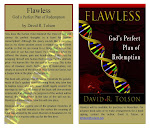There has been a curious question regarding the fact that if the Jews are God’s chosen people, then why is it that they do not embrace the redemptive work of Jesus Christ. The short answer to this is that God purposely blinded them according to Romans 11, which we discussed briefly in Part I of this series. Verse 25 of this chapter reveals for the first time a mystery that blindness in part has happened to
God has revealed that the mystery of
33. O the depth of the riches both of the wisdom and knowledge of God! how unsearchable are his judgments, and his ways past finding out! 34. For who hath known the mind of the Lord? or who hath been his counseller? 35. Or who hath first given to him, and it shall be recompensed unto him again? 36. For of him, and through him, and to him, are all things: to whom be glory for ever. Amen (Romans
Apostle Paul understood the revelation of the mystery regarding redemption and the blindness of the Jews: Their blindness was our salvation, but conversely, inherent in verse 31 is the question of what would have happened if they had not been blinded by the hand of God. It is a challenge to speculate on how God’s plan of redemption would have unfolded if things transpired differently, because certainly God would have simply altered his plan to accommodate the different events. However; hypothetically speaking in this instance, it would appear that if the Jews had not been blinded, the cascading events that led to the death of Jesus and ultimately redemption would not have happened, because the Jews would have embraced their savior and never demanded for his death.
In fact, Pilot, who may not have known that Jesus was the savior, understood that he was a just man. Consequently, he manipulated his sentencing to persuade the hostile crowd clamoring for his death to have Jesus released:
15. Now at that feast the governor was wont to release unto the people a prisoner, whom they would. 16. And they had then a notable prisoner, called Barabbas. 17. Therefore when they were gathered together, Pilate said unto them, Whom will ye that I release unto you? Barabbas, or Jesus which is called Christ? 18. For he knew that for envy they had delivered him. 19. When he was set down on the judgment seat, his wife sent unto him, saying, Have thou nothing to do with that just man: for I have suffered many things this day in a dream because of him. 20. But the chief priests and elders persuaded the multitude that they should ask Barabbas, and destroy Jesus. 21. The governor answered and said unto them, Whether of the twain will ye that I release unto you? They said, Barabbas (Matthew 27: 15-21).
22. Pilate saith unto them, What shall I do then with Jesus which is called Christ? They all say unto him, Let him be crucified. 23. And the governor said, Why, what evil hath he done? But they cried out the more, saying, Let him be crucified. 24. When Pilate saw that he could prevail nothing, but that rather a tumult was made, he took water, and washed his hands before the multitude, saying, I am innocent of the blood of this just person: see ye to it. 25. Then answered all the people, and said, His blood be on us, and on our children. 26. Then released he Barabbas unto them: and when he had scourged Jesus, he delivered him to be crucified (Matthew 27: 22-26).
Pilot withheld offering the thieves to the people, because he figured the crowd would select one of them to be released, but after seeing that they chose a murderer over Jesus, he washed his hands of his innocent blood.
The most famous trial in world history ended with the capital punishment of an innocent man; however, the death of Christ triggered a far more vastly important event than Pilot could ever imagine – the redemption of humanity.
…to be continued


No comments:
Post a Comment